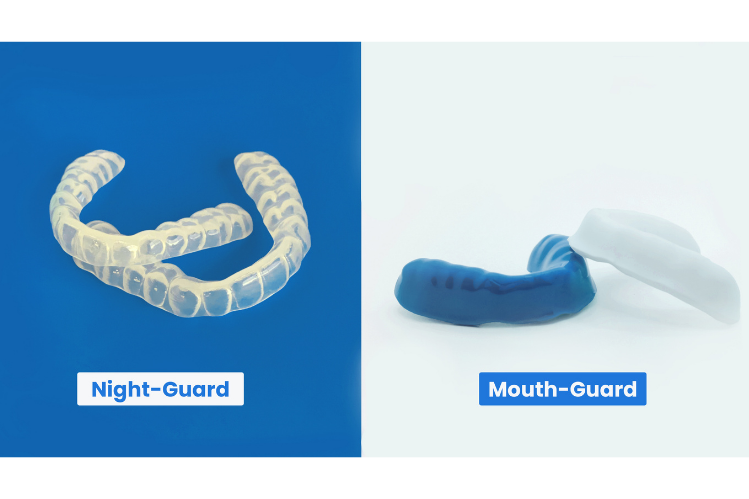
Tabla de contenido
- ¿Por qué necesitamos protectores bucales?
- Dos categorías principales de protectores bucales
- Protectores bucales deportivos: defensa en el campo
- Tipos de protectores bucales deportivos
- Tipos de protectores bucales: una comparación rápida
- Protectores nocturnos: protección mientras duermes
- Bruxismo y ATM: ¿Dónde entran en juego los protectores nocturnos?
- Posibles efectos secundarios de los protectores dentales nocturnos
- Hacer que los protectores bucales sean asequibles
- Cómo elegir el protector bucal adecuado: una guía rápida
- Charla real: ¿Por qué muchas personas lo posponen?
- ¿Por qué ALIGNERCO encaja en esto?
- Explicación de los tipos de protectores bucales
- Preguntas frecuentes
Tus dientes hacen mucho más que masticar la comida. Enmarcan tu sonrisa, te ayudan a hablar y tienen una conexión directa con Tu confianza. A menudo la damos por sentado hasta que algo sale mal. Un diente roto por jugar al baloncesto. Un Dolor de mandíbula por una noche de insomnio rechinando los dientes. ¿Te suena?
Aquí es donde entran en juego los protectores bucales. Son un protector invisible entre los dientes y cualquier fuerza que intente interponerse entre ellos. dañarlos. Ya sea que te entregues por completo a un partido de fútbol o que estés moliendo inconscientemente durante Otra noche, el protector bucal hace el trabajo de absorber las fuerzas contra los dientes.
Sin embargo, hay un giro interesante. No existe un solo tipo de protector bucal. Los tipos de protectores bucales difieren. Desde deportes hasta el sueño. Si bien ambos tipos están diseñados para la protección, su funcionamiento y los problemas que resuelven son... Muy diferente. ¡Veamos cómo!
¿Por qué necesitamos protectores bucales?
Imagínate esto. Estás en medio de un partido de baloncesto, saltando para coger un rebote, y el codo de alguien te golpea la mandíbula. Ese repentino... El impacto envía fuerza directamente a los dientes. Sin protección, el esmalte se agrieta. Quizás un diente se astille o peor aún, se dañe. noqueado.
Ahora, cambia de escena. Son las 2 a. m. Estás dormido, pero tu mandíbula está ocupada apretando y rechinando. Noche tras noche, eso... La presión desgasta los dientes como papel de lija. Te despiertas con tensión mandibular, incluso con dolor de cabeza. Eso es bruxismo. Ambas situaciones son muy diferentes, pero comparten una solución: los protectores bucales.
Funcionan como amortiguadores. En los deportes, absorben el impacto. Por la noche, forman una barrera que impide que los dientes... rozando entre sí. Y además de proteger el esmalte, pueden proteger las encías, la mandíbula e incluso reducir la tensión en músculos faciales.
Dos categorías principales de protectores bucales
Simplifiquemos. Cada protector bucal se clasifica en dos grandes categorías:
- Protectores bucales deportivos : diseñados para deportistas.
- Protectores nocturnos (Protectores nocturnos dentales) : diseñados para dormir y rechinar los dientes.
Ambos importan. Ambos protegen. Pero están hechos para batallas diferentes.
Protectores bucales deportivos: defensa en el campo

Si alguna vez has visto rugby, probablemente hayas notado que le faltan dientes. Los deportes son impredecibles, y también lo son. Lesiones. Por eso los protectores bucales deportivos son tan importantes.
Por qué son imprescindibles para los deportistas
- Absorben los impactos de los golpes en la cara.
- Prevenir la rotura o caída de dientes.
- Protege los labios y la lengua de cortes.
- Reduce el riesgo de fracturas de mandíbula.
Algunos estudios incluso sugieren que los protectores bucales deportivos pueden reducir el riesgo de conmoción cerebral al amortiguar la mandíbula durante impacto.
Y seamos sinceros, nadie quiere ser “esa persona” a la que le falta un diente en la foto del equipo.
Tipos de protectores bucales deportivos

Cuando se trata de protectores bucales, los atletas tienen varias opciones para elegir, cada una con sus propias características únicas, Ventajas y desventajas. A continuación, se presenta una descripción más detallada de los principales tipos de protectores bucales que suelen usar los atletas. considerar:
Protectores bucales de serie
Los protectores bucales estándar son la opción más básica disponible. Vienen preformados y listos para usar. paquete. Si bien son la opción más asequible, y suelen costar menos que otros tipos, a menudo se quedan cortos en rendimiento. Estos protectores bucales pueden resultar voluminosos e incómodos, lo que dificulta que los atletas respiren o comunicarse eficazmente mientras los usa. Su falta de ajuste personalizado significa que pueden moverse durante la intensidad actividad física, proporcionando una protección inadecuada contra los impactos.
Protectores bucales de hervir y morder
Un paso adelante de los protectores bucales estándar, los protectores bucales de hervir y morder ofrecen un ajuste más personalizado sin gastar una fortuna. usa uno, sumerges el protector bucal en agua caliente para ablandarlo, luego lo muerdes para moldearlo a la forma de tus dientes. Este proceso produce un mejor ajuste que las opciones estándar, lo que permite una mayor comodidad y funcionalidad durante la práctica deportiva. actividades. Si bien brindan una protección decente, es importante tener en cuenta que pueden no durar tanto como los hechos a medida. Alternativas. Aun así, para muchos atletas, su asequibilidad y su personalización moderada los convierten en una opción popular.
Protectores bucales a medida
Considerados el estándar de oro en tecnología de protectores bucales, los protectores bucales hechos a medida están diseñados específicamente para un paciente. La estructura dental de cada persona. Un profesional dental crea un molde preciso de sus dientes, asegurando que... El protector bucal se ajusta perfectamente. Este nivel de personalización no solo mejora la comodidad, sino que también maximiza la protección, ya que Los protectores bucales a medida están diseñados para absorber los impactos eficazmente. Suelen ser la opción más duradera; la calidad... Los materiales garantizan una mayor durabilidad que sus contrapartes convencionales o de cocción y cocción. Sin embargo, todos estos beneficios vienen a un precio un poco más alto, lo que los convierte en la opción más cara disponible.
La elección del protector bucal en última instancia depende de la preferencia personal, el presupuesto y el nivel de protección necesario. Los atletas deben considerar cuidadosamente estos factores para seleccionar la opción que mejor se adapte a sus necesidades en el campo o corte.
Tipos de protectores bucales: una comparación rápida
| Tipo | Comodidad y ajuste | Nivel de protección | Costo | Más adecuado para |
|---|---|---|---|---|
| Existencias | Pobre | Bajo | Muy bajo | Niños o juego casual |
| Hervir y morder | Justo | Medio | Moderado | Atletas adolescentes y adultos |
| Ajuste personalizado | Excelente | Alto | Más alto | Atletas serios |
Protectores nocturnos: protección mientras duermes

Ahora, cambiemos de tema. A diferencia de los protectores dentales deportivos, los protectores nocturnos funcionan mientras duermes. Protegen contra el rechinamiento. (bruxismo) y apretar los dientes, lo cual puede ser sorprendentemente destructivo.
El costo oculto de la molienda
Rechinar los dientes no solo es molesto. Con el tiempo, puede:
- Desgasta el esmalte.
- Provoca sensibilidad dental.
- Provoca dolor en la mandíbula o trastorno de la ATM.
- Provoca dolores de cabeza matutinos.
- Incluso puede provocar empastes agrietados o coronas rotas.
Y lo más preocupante es que la mayoría de las personas ni siquiera saben que lo están haciendo hasta que aparece el daño.
Ahí es donde entra en juego un protector bucal para el bruxismo. Actúa como un amortiguador, salvando sus dientes del bruxismo constante. presión.
Tipos de protectores nocturnos

No todos los protectores nocturnos son iguales. Al considerar las opciones de protectores nocturnos dentales, es fundamental comprender... diferentes tipos disponibles y sus respectivos beneficios.
Protectores nocturnos suaves
Están fabricados con materiales flexibles, lo que los hace increíblemente cómodos de usar durante el sueño. Estos protectores son... Especialmente beneficioso para personas que rechinan los dientes con suavidad, ya que proporciona un suave efecto de amortiguación. Sin embargo, vale la pena señalar que, si bien ofrecen comodidad y un buen ajuste, tienden a desgastarse más rápidamente que otros. tipos de protectores, lo que significa que es posible que sea necesario reemplazarlos con mayor frecuencia.
Protectores de acrílico duro
Por otro lado, están diseñados para quienes rechinan los dientes de forma más agresiva, lo que los convierte en una opción ideal. Para amoladoras pesadas. Estas protecciones están fabricadas con materiales rígidos y duraderos, lo que proporciona una excelente protección. contra el desgaste causado por el rechinamiento. Si bien son increíblemente eficaces para proteger los dientes, pueden ser menos cómodos que sus contrapartes más suaves. Los usuarios pueden notar que el ajuste inicial requiere un tiempo para acostumbrarse, ya que La dureza puede provocar una sensación de menor amortiguación durante la noche.
Guardias híbridos
Ofrecen una solución única que combina las ventajas de los protectores nocturnos blandos y duros. Estos protectores suelen consistir en... Con una capa interior suave que proporciona comodidad y una capa exterior dura que garantiza durabilidad y protección. Este diseño... Los hace especialmente adecuados para amoladoras de uso medio a pesado, ya que logran un equilibrio óptimo entre comodidad y resistencia. Al elegir una protección híbrida, los usuarios pueden disfrutar del efecto de amortiguación sin perder la robustez. la protección que sus dientes necesitan.
La elección de un protector bucal nocturno depende en gran medida de la gravedad del rechinamiento y de las preferencias personales de comodidad. Protector bucal nocturno suave. Los protectores son excelentes para la comodidad, pero pueden desgastarse rápidamente; los protectores de acrílico duro brindan durabilidad para amoladoras pesadas. A costa de la comodidad, los protectores híbridos ofrecen una opción versátil para quienes necesitan un equilibrio entre ambos.
Bruxismo y ATM: ¿Dónde entran en juego los protectores nocturnos?
Hablemos de detalles específicos.
- Protector nocturno para el bruxismo dental: el mejor protector bucal para el bruxismo dental es un protector nocturno personalizado, diseñado para adaptarse a sus dientes. Perfectamente, proporcionando el máximo confort y protegiendo el esmalte, previniendo daños y aliviando la presión de la mandíbula.
- Protector bucal para ATM : ayuda a alinear la mandíbula en una posición ligeramente más relajada, lo que reduce la tensión en la articulación.
¿Son curas? No. Pero se ha demostrado que controlan los síntomas y previenen daños mayores. Y, sinceramente, despertar sin... El dolor de mandíbula o de cabeza parece un pequeño milagro.
Posibles efectos secundarios de los protectores dentales nocturnos

Aquí hay algo que la gente suele preguntar: "¿Son seguros los protectores nocturnos? ¿Tienen efectos secundarios?"
La verdad: si se instalan correctamente, son muy seguros. Pero sí, los mal fabricados pueden causar problemas.
- Irritación de las encías debido a bordes ásperos.
- Exceso de saliva (tu cuerpo piensa que es comida al principio).
- La desalineación de la mandíbula se produce si el ajuste no es el adecuado.
- Dificultad para respirar con protectores de culata voluminosos.
Los mejores protectores nocturnos para el bruxismo son los de buena calidad. No son negociables. Los protectores de serie son económicos. razón. Y rara vez son la solución para el bruxismo grave.
Hacer que los protectores bucales sean asequibles
Los dentistas suelen cobrar cientos de dólares por protectores nocturnos personalizados. Los atletas pagan aún más por protectores deportivos profesionales. Pero ALIGNERCO ofrece protectores hechos a medida a una fracción del precio y ni siquiera necesita salir de su casa.
He aquí por qué los protectores bucales personalizados ALIGNERCO son mejores :
- Comodidad personalizada sin diseños voluminosos.
- Protección de nivel profesional tanto para deportistas como para amoladores.
- Proceso sencillo de pedido desde casa, sin múltiples visitas al dentista.
- Precios asequibles que hacen que la protección sea accesible.
Su protección se ha hecho práctica.
Cómo elegir el protector bucal adecuado: una guía rápida
¿Te sientes abrumado? Simplifiquemos la decisión:
- ¿Eres deportista? → Consigue un protector bucal deportivo (preferiblemente personalizado si juegas en serio).
- ¿Rechinas los dientes por la noche? → Necesitas un protector nocturno para el bruxismo dental.
- ¿Sufre de dolor de mandíbula o ATM? → Considere un protector bucal para ATM, idealmente hecho a medida.
Piénsalo de esta manera: no se trata de si necesitas uno, sino de cuál necesitas.
Charla real: ¿Por qué muchas personas lo posponen?
Seamos honestos. Mucha gente sabe que necesita un protector, pero lo pospone. Quizás lo sienta innecesario. Quizás... El precio del dentista les hace dudar. O quizá piensen: «Rechinar los dientes no es tan grave».
Pero aquí está la cuestión: el daño no ocurre de la noche a la mañana. Se acumula lentamente, hasta que un día te encuentras frente a un edificio agrietado. Factura de diente y corona de $800.
La prevención es más barata. Y mucho menos dolorosa.
¿Por qué ALIGNERCO encaja en esto?
Accesibilidad y asequibilidad
ALIGNERCO ofrece una ventaja significativa sobre los protectores dentales tradicionales al priorizar la accesibilidad y Asequibilidad. A diferencia de las opciones convencionales, que suelen requerir largas consultas, semanas de espera y tarifas elevadas, ALIGNERCO agiliza el proceso.
Proceso optimizado
Con su enfoque innovador, simplemente pide un kit de impresión, toma tus propias impresiones dentales en casa y Devuélvalos. Esto le permite recibir un protector personalizado, adaptado específicamente a sus necesidades. sin la tensión financiera típicamente asociada con el cuidado dental.
Soluciones versátiles
Esta flexibilidad convierte a ALIGNERCO en una opción atractiva para diversos desafíos dentales. Ya sea que necesite lo mejor protector nocturno para combatir el bruxismo, un protector bucal especializado diseñado para trastornos de la ATM o un protector deportivo. protector bucal, ALIGNERCO cubre todas las bases.
Compromiso con la calidad
Su proceso fácil de usar garantiza que la protección dental de alta calidad sea accesible para todos, lo que le permite Proteja sus dientes de forma eficiente y rentable. Este compromiso con la asequibilidad y la comodidad es lo que distingue ALIGNERCO se distingue en el mercado de protectores dentales, lo que lo convierte en una opción inteligente para quienes buscan mantener su salud bucal. Sin gastar demasiado.
Explicación de los tipos de protectores bucales
Usamos fundas para nuestros teléfonos, seguros para nuestros autos e incluso aerosoles impermeabilizantes para nuestros zapatos. Sin embargo, muchos... Olvídate de proteger tus dientes, que utilizas todos los días.
Un protector bucal puede no ser tan atractivo como otros artículos. No es llamativo, pero es una forma discreta de defensa. El protector bucal te protege del dolor, los gastos y el arrepentimiento.
Entonces, tal vez no deberíamos preguntarnos: "¿Necesito un protector bucal?". Deberíamos preguntarnos: "¿Por qué no debería usarlo?".
Preguntas frecuentes
1. ¿Cómo utilizar correctamente un protector bucal?
Úselo según las indicaciones, generalmente mientras duerme o practica deportes, y límpielo después de cada uso.
2. ¿Cuánto tiempo se hierve un protector bucal para moldearlo?
Normalmente entre 30 y 60 segundos, siga las instrucciones del fabricante.
3. ¿Cómo conseguir el tamaño adecuado de protector bucal?
Elija un protector diseñado para su edad/tamaño o consiga uno personalizado de ALIGNERCO.
4. ¿Cómo elegir el protector bucal adecuado?
Tenga en cuenta sus necesidades: suave para un pulido ligero, duro para un pulido intenso o personalizado para un mejor ajuste. y protección.
5. ¿Cómo saber si un protector bucal se ajusta correctamente?
Debe quedar cómodo, permanecer en su lugar sin esfuerzo y no causar dolor.
6. ¿Los protectores bucales son de talla única?
No, los protectores estándar son genéricos, pero los protectores personalizados están hechos para adaptarse exactamente a sus dientes.
7. ¿Debo morder mi protector bucal?
No, debe permanecer en su lugar sin necesidad de morderlo ni apretarlo constantemente.
8. ¿Cómo ajustar perfectamente un protector bucal?
Para protectores bucales hervir y morder: calentar, colocar en la boca, morder suavemente y presionar con los dedos o la lengua. Para un ajuste perfecto. Para los protectores dentales a medida, solo tienes que colocártelo en la boca; se ajustan perfectamente a tu boca. dientes.
9. ¿Cómo detener la saliva al usar un protector bucal?
La saliva generalmente disminuye a medida que uno se acostumbra a ella; practique usándola regularmente para adaptarse.
Citas:
Profesional, CCM (2025b, 18 de agosto). Protector bucal. Clínica Cleveland. https://my.clevelandclinic.org/health/treatments/10910-mouthguards
Marks, J. (18 de enero de 2024). ¿Necesito un protector bucal? WebMD. https://www.webmd.com/oral-health/mouth-guards
Asociación Dental Americana. (2006). Uso de protectores bucales para reducir la incidencia y la gravedad de las infecciones bucales relacionadas con el deporte. lesiones. Revista de la Asociación Dental Americana, 137(12), 1712–1720. https://doi.org/10.14219/jada.archive.2006.0112






